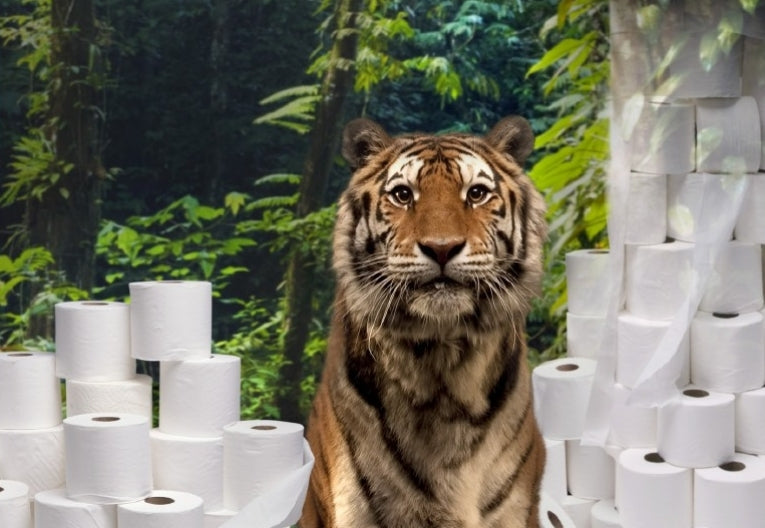We know how difficult it is to link products to dangerous practices. Eco-friendly companies and individuals are going to be shocked once more at the habitat destruction wreaked on rainforests by their toilet paper, paper towels and tissue.
The huge island of Sumatra has just about the greatest loss of forest of any area in the world. Everybody wants a piece of it, including elephants, orang-utans, rhino and the approximate 280 Sumatran tigers left in the wild. It has now been disclosed in a WWF report that APP's fiber, used by 8 large retailers (BI-LO, Brookshire Grocery Company, Delhaize Group (owner of Food Lion chain), Harris Teeter, Kmart, Kroger, SUPERVALU, and Weis Markets) is to be discontinued because of this link. (APP is Asia Pulp and Paper, subsidiary to the giant Chinese Sinar Mas Group.)
WWF (World Wildlife Fund) is the first to praise this move by these eco-conscious companies. "We applaud the decision by these companies to remove these products from their stores," said Jan Vertefeuille, head of WWF's Tiger Campaign.
APP is among several affiliates who are alleged to have destroyed 5 million acres of rainforest in Sumatra since 1984, distributing and expanding its paper products through many US paper companies. One major example is the non-home products, Paseo (the fastest growing toilet-paper sale in the US and especially in California) and Livi, which you find in hotels, restaurants, schools and offices. Many companies have not responded to appeals and are listed on the WWF site. You can look at "Who sells these Products?" or elsewhere in the informative article.

Certainly, more than 50% of American consumers applaud sustainability, while the rest of the world are more eco-friendly, or less, depending largely of development. This is a chance to kick back at organisations who really don't listen to the simple lessons taught our children and our ancestors. "Save the Planet, because it has certainly saved us."
WWF quote the Indonesian Ministry of Forestry which estimates the total carbon emissions from deforestation and associated peat decomposition and burning to be 1.2 gigatons per year. These massive emissions from deforestation make Indonesia the world's third-largest greenhouse gas emitter. Around 60 percent of this carbon emission is estimated to occur in Riau Province, the epicenter of APP's pulp mill and deforestation operations.
Species saved from this immense forest loss and carbon emission are few. Sustainable tourism helps to preserve a tiny enclave here and there, but governments and multinationals are the only true saviours of our last wild places. Individuals must act in order to ensure that this happens. It's up to every person who might just be using a product they never even give a second thought to.










